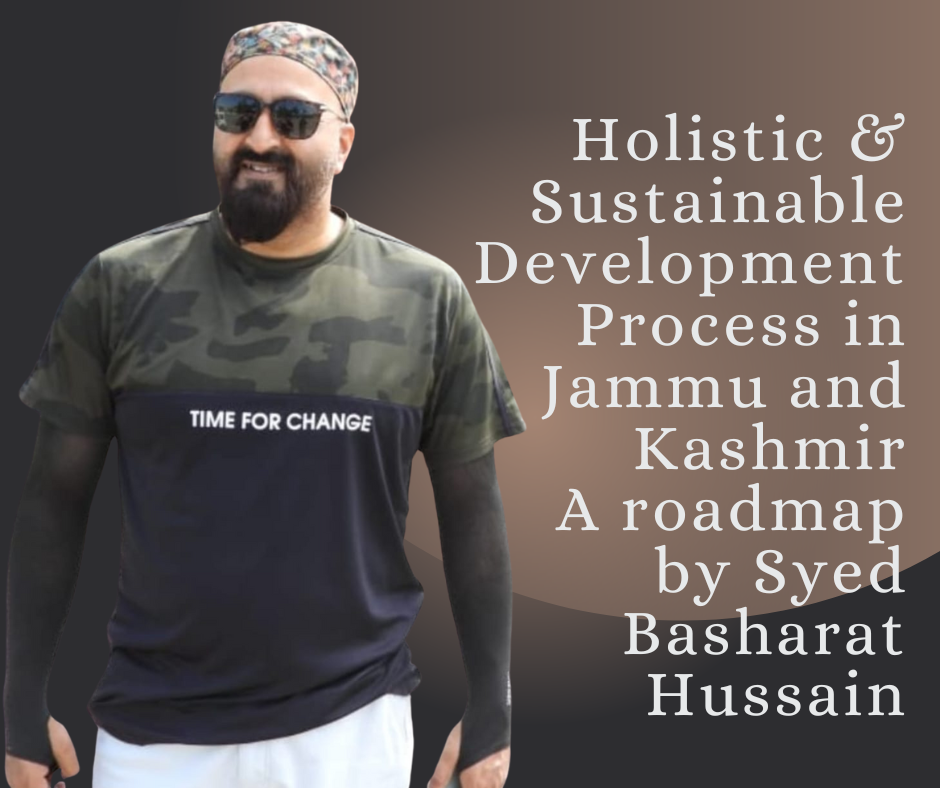Jammu and Kashmir (J&K), a Union Territory (UT) of India, is a region endowed with breath-taking natural beauty, rich cultural heritage, and a strategic location. Despite these advantages, the region faces significant challenges due to its landlocked geography, harsh climate and underdeveloped infrastructure. Holistic and sustainable development in J&K requires an integrated approach that addresses economic growth, social equity, and environmental protection. It is in this backdrop that Syed Basharat Hussain plans to work towards a vision for holistic development of J&K. His vision for J&K is to transform it into a model of sustainable development, where economic prosperity, social inclusiveness, and environmental sustainability go hand in hand. This involves leveraging its unique strengths while addressing its specific challenges.
Key Components of the Holistic Development Process
- Economic Development
- Agriculture and Horticulture: Modernizing agriculture with advanced technologies, promoting organic farming, and developing high-value crops such as saffron and apples.
- Tourism: Developing sustainable tourism that showcases J&K’s natural and cultural heritage while minimizing environmental impact.
- Handicrafts and Cottage Industries: Reviving traditional crafts through skill development programs, marketing support, and creating export opportunities.
- Infrastructure Development: Building robust transportation, energy, and communication networks to integrate J&K with national and global markets.
- Social Development
- Education: Improving educational infrastructure and quality, with a focus on vocational and technical training to enhance employability.
- Healthcare: Strengthening healthcare systems, increasing accessibility, and improving healthcare services, particularly in remote areas.
- Social Inclusion: Promoting social cohesion by addressing the needs of marginalized communities, including women, children, and minorities.
- Environmental Sustainability
- Natural Resource Management: Implementing sustainable practices for water, forest, and land management to preserve J&K’s rich biodiversity.
- Renewable Energy: Promoting the use of renewable energy sources such as solar, wind, and hydro power to reduce dependency on fossil fuels.
- Climate Resilience: Developing strategies to mitigate and adapt to the impacts of climate change, including disaster preparedness and management.
Roadmap to Holistic Development
Achieving holistic development requires a multifaceted approach that addresses various aspects of governance, human resource development, community involvement, sustainable infrastructure, and technological innovation. Mr. Basharat’s roadmap outlines key strategies to create a balanced and inclusive growth model that benefits all segments of society. By implementing policy reforms to enhance governance, investing in education and entrepreneurship, empowering local communities, developing sustainable infrastructure, and leveraging technology and innovation, we can build a resilient and thriving society. These initiatives, when executed in harmony, lay the foundation for long-term prosperity and environmental sustainability, ensuring that development is both equitable and forward-looking. Syed Basharat Hussain advocates multipronged approach towards holistic development in J&K that includes but is not limited to:
- Policy Reforms and Governance
- Establishing transparent and efficient governance structures to implement development policies effectively.
- Encouraging public-private partnerships to mobilize resources and expertise.
- Capacity Building and Human Resource Development
- Investing in education and training to build a skilled workforce that can drive economic growth and innovation.
- Promoting entrepreneurship through incubation centers, financial support, and market access.
- Community Participation and Empowerment
- Involving local communities in the planning and implementation of development projects to ensure they are tailored to local needs and conditions.
- Enhancing the role of Panchayati Raj Institutions (local self-governments) in decision-making processes.
- Sustainable Infrastructure Development
- Developing sustainable urban and rural infrastructure that supports economic activities while preserving environmental integrity.
- Implementing green building practices and promoting eco-friendly transportation options.
- Technology and Innovation
- Leveraging technology to improve efficiency, transparency, and service delivery in various sectors.
- Encouraging innovation through research and development initiatives, particularly in agriculture, tourism, and renewable energy.
In conclusion, holistic and sustainable development in J&K is a complex but achievable goal believes Syed Basharat Hussain. By adopting a bottom – up participatory and an integrated approach that combines economic growth, social equity, and environmental sustainability, J&K can overcome its challenges and unlock its full potential. This vision requires commitment, coordination, and collaboration among various stakeholders, including the government, private sector, civil society, and local communities. That’s precisely what Mr. Basharat is striving for.




